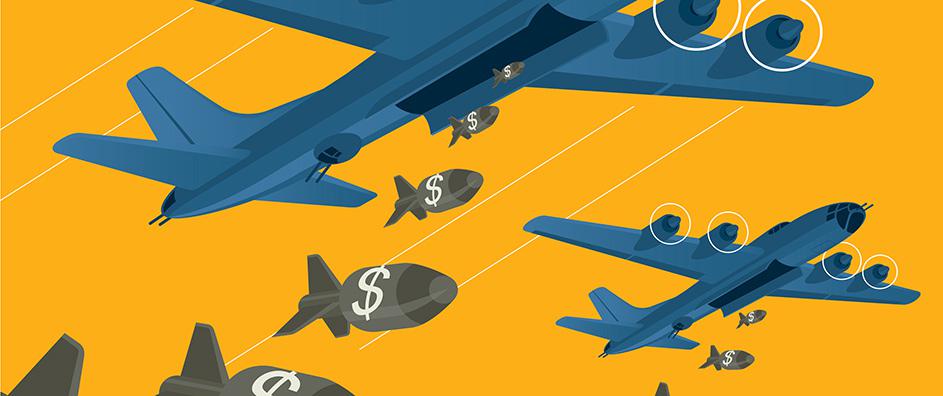Throughout history, the calamities of war have consistently stemmed not just from overt hostilities and stratagems of power, but also from underlying currents of human nature and societal constructs. A pivotal consideration within the Bahá’í teachings is the profound role that greed, commerce, and self-interest play as the elemental roots of conflict. What if we were to ponder: could the insatiable pursuit of material wealth be the Trojan horse of our modern civilization? This question invites an exploration of the philosophical and practical tenets of how these forces interact, and offers insights into mitigating their detrimental impact on humanity.
The Bahá’í perspective recognizes that every war, irrespective of its immediate causes, is ultimately ignited by emotional and psychological factors. Greed emerges as a formidable adversary, intrinsically linked to our materialistic inclinations. In the commercial realm, individuals often prioritize personal gain over collective welfare. The emblematic phrase “the love of wealth is the root of all evil” resonates deeply within the Bahá’í narrative, serving as a call to introspection about the relationship between economic pursuits and ethical considerations.
As we delve deeper into this nexus, one must consider the fundamental motivations behind human behavior in commerce. The capitalist framework, with its emphasis on competition and profit maximization, often leads to a societal dichotomy where the affluent flourish and the impoverished languish. This imbalance paves the way for social unrest and, ultimately, conflict. Can one disregard the latent tension that festers when the needs of the many are overshadowed by the avarice of the few? In doing so, we might identify a cyclical phenomenon where greed perpetuates inequality, and inequality begets strife.
The examination of self-interest within this context compels us to scrutinize the prevailing economic paradigms. The notion that individuals act solely in their own interest—often at the expense of others—is not only a premise in classical economic theory but also a pervasive reality in practice. While rational self-interest may seem a natural human tendency, the Bahá’í teachings advocate for a more altruistic approach, where personal ambitions are harmoniously aligned with the greater good. This collective ethos posits that true progress can only be achieved when we transition from self-serving behaviors to a model that cherishes interdependence and collaborative success.
This shift, however, is fraught with challenges. Envision a society where altruism supersedes greed—a seemingly utopian aspiration. Would individuals yield to such a paradigm voluntarily, or would it necessitate an upheaval in value systems? Such questions necessitate rigorous discourse. For instance, consider the corporate culture perpetuated by major businesses today: do they prioritize ethical responsibility over profitability? Are they willing to sacrifice short-term gains for sustainable practices that benefit society at large? This inquiry unveils a chasm between theoretical ideals and practical realities.
Another dimension of this dialogue is the role of commerce in exacerbating conflicts. Wars are often financed through capital gained from trade, whether legal or illicit. Arms trading, human trafficking, and the exploitation of natural resources are stark manifestations of an economy driven by greed and self-interest. The Bahá’í teachings openly decry such practices, emphasizing that the true essence of commerce should revolve around the betterment of humanity rather than mere profit. This revelation necessitates a radical reevaluation of our economic practices, urging a shift from exploitative strategies to ethical entrepreneurship.
Furthermore, the globalized nature of commerce complicates these interactions. In a world interconnected by trade, the repercussions of one nation’s economic policy can reverberate worldwide, potentially igniting tensions and conflicts across borders. Thus, the imperative for a global consciousness, anchored in the principles of unity and justice, becomes all the more pressing. The Bahá’í teachings assert that such interconnectedness provides not only challenges but also opportunities for collective action against the forces that incite war.
Reflecting on these teachings engenders an avenue for personal responsibility. Each individual has the capacity to influence the wider economic ecosystem, either through conscious consumerism or by advocating for corporate accountability. As we embrace these ideals, it becomes essential to cultivate a mindset that prioritizes ethical consumption and discourages indulgence in material excesses. This paradigm shift may serve as a foundation to mitigate the pernicious effects of greed, commerce, and self-interest in our lives and societies.
In conclusion, the nexus between greed, commerce, self-interest, and war is an intricate tapestry, woven from historical, philosophical, and economic threads. As guardians of humanity’s collective future, the teachings of the Bahá’í Faith illuminate pathways toward understanding, harmony, and peace. By recognizing the deeply ingrained nature of these challenges, we are confronted—not only with an intellectual challenge but also with a moral one. Will we heed the clarion call for a more just and equitable world? The exploration of this vital question lies at the heart of our endeavor to foster enduring peace, unity, and understanding among all people.
